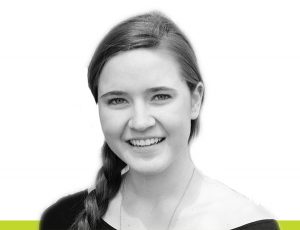
This blog post is a part of the YTH Staff Interview Series, where we are featuring an in-depth Q&A with each member of our staff, weekly. This week, we’re talking to one of our newest team members, our Summer Intern Emma Pence. A third-year student at Virginia Tech, where she is double-majoring in Human Development and International Studies with a concentration with Global Development. Emma has been working as an advocate at her university’s Health Education Awareness Team (HEAT), a peer-education program that serves the Virginia Tech Campus and surrounding communities.
Emma has become passionate about youth health, and sexual health in particular, through teaching programs where she witnessed youth developing and implementing their own initiatives to their peers about wellness. Along these lines, I spoke with her about her studies at Virginia Tech, her experience as a peer health educator, and her new position at YTH.
ERIN: You recently joined our team as a summer intern. Welcome! How did you hear about YTH? What interested you about working with us?
EMMA: I heard about YTH from a family friend, David Goldsmith, who currently serves as YTH’s Board Chair. I was telling David about my interest in public health, particularly with sexual health, and he shared with me about YTH!
ERIN: Tell us about your experience providing sexual health education on campus at Virginia Tech, especially Health Education Awareness Team (HEAT). What are some of the activities you did?
EMMA: The Health Education Awareness Team (HEAT) at Virginia Tech is a group of around 20 students who teach health and wellness to students on campus. We teach a variety of workshops including safe sex, contraception, nutrition, sleeping, sun care, tobacco use, mental health and other topics. Throughout the year we also hold special events to promote awareness of issues.
HEAT also teaches via information booths throughout the year. In November for Men’s Health Month we had a “check your balls” booth where we educate men on how to do a testicular self-exam. We also have giveaway events such as “wrap that package” in December where we give out free condoms for answering sexual health questionnaires.
For every workshop, there are at least two HEAT mentors co-facilitating the program to a group of college students whether it be in a student organization or open to all. The participants are much more open and willing to engage in conversations around more sensitive topics that they may not usually talk about. Since it is a peer on their same level delivering the health information they do not feel as judged, particularly when asking questions they may have had for a while but didn’t know how to ask.
As mentors, many people in our networks around campus also look for us to spread accurate health information. During weekly meetings we discuss what health concerns we have heard been raised recently and think of ways to help combat those issues. It’s effective to have an organization designed around student input with programs carried out by students for their peers.
ERIN: You’re the same age as some of the young people that YTH serves in its programs, research, and YTH Live conference. What do you think is the biggest misconception about youth today and how do you see YTH working towards correcting that?
EMMA: I think one of the biggest misconceptions about youth today is that they are worse than ever in terms of drug and alcohol use and earlier initiation of sex. YTH recently shared an article for a study conducted by the CDC that states today’s youth are the most well behaved yet. Not only has the prevalence of drug and alcohol use decreased in teens but they are waiting to have sex at an older age. YTH is helping teens make responsible decisions by making knowledge and resources surrounding topics such as sexual health accessible for them. Through different programs YTh empowers youth to share their opinions to shape programs particularly in subjects that affect them.
ERIN: What do you hope to see yourself doing in the future as a professional in the public health field and how can YTH help you achieve those goals?
EMMA: In the future I want to continue on to get my Master’s in Public Health and then work specifically with maternal, newborn, and child health. and then work specifically with maternal, newborn, and child health. Through my internship with YTH I am gaining a thorough understanding of mhealth programs and what it means to use technology as a platform for health initiatives. YTH is allowing me to explore my passion for sexual health and see how youth centered design can be most effective. I am currently assisting on a new program during the beginning phases which shows me the many layers and complexities of planning and implementing projects. I am learning invaluable skills during my time at YTH that will help me with future endeavors.
ERIN: Do you have any advice for young people looking to get involved in public health and social and reproductive justice?
EMMA: Start getting involved early on so that you can explore all of the aspects of the field. Your first experience can be small, such as volunteering with a non-profit in your area or at a free clinic. You will then be able to find out what you are most passionate about and pursue future opportunities and connections in that specific area. Social and reproductive justice are currently big topics of conversation and you can influence the future of it by becoming involved now.
To learn more about Emma and her work, read her full bio here.
tags: health, intergenerational leadership, internships, leadership, reproductive health, technology, youth, youth health, youth leaders, YTH, YTH Live, yth staff, yth staff interviews.
Previous Post
A Renewed Focus on Mental Health